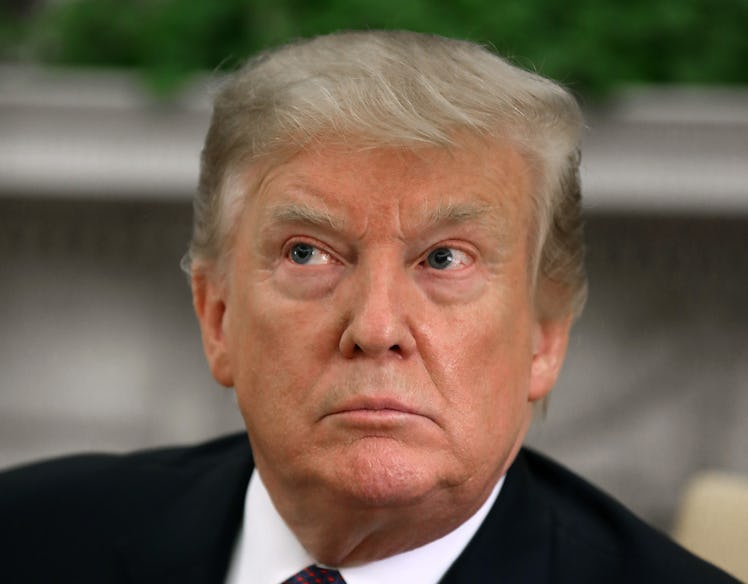
Migrant Children Will Be Held At A Former Japanese Internment Camp
Hi, and welcome to your daily dose of strange news. This time, it's coming out of the Trump administration. Under the administration, migrant kids will be held at a former Japanese internment camp — and no, I'm not kidding. It's a bit, um... on the nose, huh?
TIME broke the news on Tuesday, June 11 that migrant children will be housed at Fort Sill, an army base in Oklahoma, starting as early as July 2019. According to the report, the Trump administration has run out of places to put migrant children, so it's turned to the roughly 150-year-old base that was used to intern Japanese-Americans during World War II — and was once used to hold German prisoners of war. Politico described the facility in 2014 as a "three-story barracks and training building" that has 20 sleeping bays. In an email to Elite Daily, the U.S. Department of Health and Human Services (HHS) confirmed that the fort had been activated as a " temporary emergency influx shelter," with capacity for 1,400 unaccompanied migrant children.
The HHS said the center is meant to act “as a temporary emergency influx shelter” to alleviate overcrowding at other facilities. The U.S. government already operates around 168 facilities and programs in nearly two-dozen states, but there apparently still isn't enough space. The HHS said in a statement shared with TIME that it had taken about 40,900 children into its custody between the beginning of 2019 through April 30, which is a 57% increase from 2018.
All things considered, the optics of sending children to the same detention area once used to house interned Japanese-Americans is... not great. In the 1940s, after the United States declared war on Japan during World War II, roughly 120,000 men, women, and children of Japanese ancestry, most of whom were U.S. citizens, were forced into makeshift internment camps around the country due to racist and xenophobic fears about their loyalty. The internment lasted four years, and has since been recognized as a serious civil rights violation. In 1988, President Ronald Reagan called the internment of Japanese-Americans a "grave wrong" and a "mistake," with the U.S. government offering a formal apology to surviving internees.
Also, the internment of Japanese-Americans has already been connected to the migrant crisis, in which thousands of immigrants have been forced into makeshift detention centers and sites. Former first lady Laura Bush spoke on the matter in a June 2018 op-ed for The Washington Post, saying the images of migrant children living in a converted Walmart and a tent city on the Texas border “are eerily reminiscent of the Japanese American internment camps of World War II, now considered to have been one of the most shameful episodes in U.S. history.”
Oh, and it gets wilder. Two other facilities were reportedly considered before Fort Still was chosen. According to TIME, one is in Georgia and the other is in Montana — a center that has more than 100 "intercontinental ballistic missiles tipped with nuclear warheads buried underground." I can't even.
It's not the first time a president has used the facility to house migrant children, though. According to Politico, the Obama administration also used it in 2014 amid an influx of border crossings, but pulled the plug on the move just four months later, acknowledging that it probably wasn't the best idea and that the number of crossings had slowed.
“We are able to take this step because we have proactively expanded capacity to care for children in standard shelters, which are significantly less costly facilities," a spokesperson for the HHS told Politico in 2014. "At the same time, we have seen a decrease in the number of children crossing the southwest border.”
The Trump administration's move does come at an interesting time, though. It was announced in early June that the administration is making cuts to programs offered to unaccompanied migrant children. The HHS' Office of Refugee Resettlement (ORR) said it intends to cancel English lessons, recreational activities, and legal support for the kids. Apparently, the move is also in response to the increase in border crossings. A spokesperson for HHS told NPR on June 5 that ORR is instructing its shelters to cut down on activities "that are not directly necessary for the protection of life and safety," citing the Antideficiency Act, which prohibits federal agencies from spending money that hasn't been allocated by Congress.
Oof. Well, if you didn't get the message that Trump is serious about his crackdown on immigration from his comments on social media and in front of the press, it looks like he just made it a lot clearer.